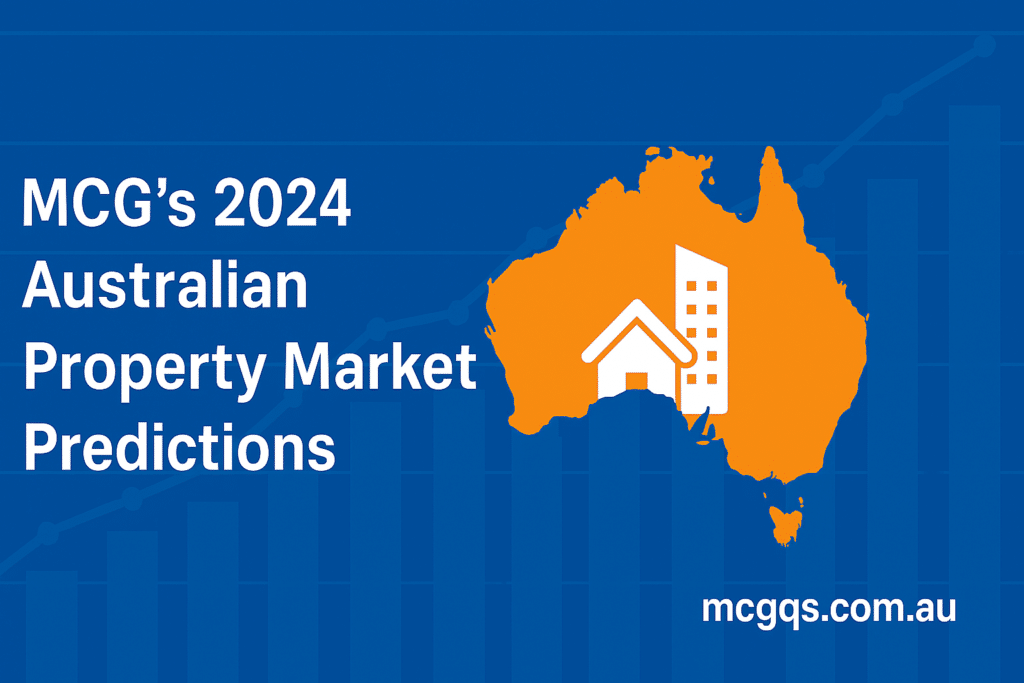MCG’s 2024 Australian Property Market Predictions

What is your overall view on how markets will perform in 2024?
The pace of construction cost growth will slow since supply chain pressures we saw during COVID have returned to normal. However, there is still a significant shortage of construction labour, exacerbated by the pipeline of government infrastructure projects. The target of building 1.2 million homes over 5 years from 1 July 2024 is fanciful at best, but nigh on impossible given the fact that it’s a pace the country has never achieved, and it’s being targeted during a period where just short of a third of all construction companies are reporting job vacancies. Whilst construction supply is consistently overstated as the panacea for the rental crisis, the fact that the pipeline of higher density residential projects is around a third of the normal long term average will likely provide no respite for tenants.
Major economists are predicting the national property market to grow between 1.5 and 8 percent. My personal view is that it’s likely to test or break the upper limit of this range.
What other key drivers should we watch over that will influence the market direction?
Interest rates are the elephant in the room, however it’s important to note that property prices have risen despite the unprecedented pace of interest rate rises. The gap between consumer sentiment around property prices and the time to buy dwelling figure points to the fact that many believe the market will continue to grow, but are not able to take advantage. Any reduction in rates will certainly supercharge sentiment, but more importantly, unlock extra borrowing capacity which will put pressure on prices. The political landscape in the leadup to some key state elections could have unpredictable impacts on the market. To date, state housing intervention has exacerbated the rental crisis, and it appears likely that the usual scapegoats will be targeted to the detriment of landlords, and in turn, rental affordability.
What are important sectors that we should watch out for in 2024?
I expect major regional markets to perform strongly, especially where there is a diverse range of employers and major infrastructure projects in the works, such as along the inland rail corridor. Diversified locations with medium price points under $600,000 will perform strongly given our data on average investor purchase prices, and the distance people are prepared to invest from where they live. The collapse of the apartment market construction pipeline will likely see a continued rebound in apartment prices, with larger properties in boutique developments, suitable for downsizers, being most in demand.
What are some surprising elements that will have a lasting impact on the market in 2024?
The continued increase in rents will likely influence housing formation rates, and certainly state political intervention. Changes to interest rates, interest rate buffers and any innovation around unlocking existing supply via stamp duty changes or downsizing incentives will have lasting impacts. Migration numbers will be interesting to watch, in concert with unemployment rates and RBA decisions, as they attempt a soft landing back into the target inflation band by 2025.
What are your final thoughts for the property market in 2024?
In closing, I believe the best time to buy was still yesterday, and for those that have access to finance, 2024 should deliver some excellent results for investors. An incredibly tight rental market, coupled with potential interest rate decreases, should see some solid yields available for investors, and significant capital growth in the right markets. As always, ensure you are conservative with you numbers, keep a safety buffer, and invest in a team of experts to help you navigate what could (and should) be a great 12 months in the property market.
